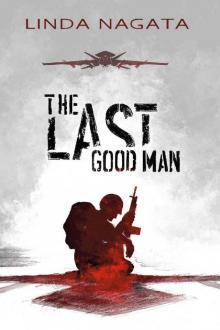- Home
- Linda Nagata
The Last Good Man
The Last Good Man Read online
The Last Good Man
Linda Nagata
Published by Mythic Island Press LLC
Kula, Hawaii
This is a work of fiction. All the characters and events portrayed in this novel are fictitious or are used fictitiously.
The Last Good Man
Copyright © 2017 by Linda Nagata.
All rights reserved. No part of this publication may be reproduced, distributed, or transmitted in any form or by any means, including photocopying, recording, or other electronic or mechanical methods, without the prior written permission of the publisher, except in the case of brief quotations embodied in critical reviews and certain other noncommercial uses permitted by copyright law.
ISBN 978-1-937197-23-0
Cover Art Copyright © 2017 by Philippe McNally
Mythic Island Press LLC
PO Box 1293
Kula, HI 96790-1293
MythicIslandPress.com
The Business of War
“We told her not to go. It was too dangerous. She told us it would be all right. There would be security.”
The gray-haired gentleman speaks in quiet syllables, each chiseled by the emotions he holds in check as he explains the circumstances that have brought him to Requisite Operations Incorporated, a private military company headquartered in Thurston County, south of Seattle. In a conference room elegantly appointed in dark-brown fabrics and hardwood surfaces, he recounts all that has gone wrong.
“The so-called security was a joke. Only six armed guards, none with adequate training, all murdered in minutes and now she’s their captive. They’ve made her speak their propaganda. They’ve put her under the veil, but it’s her. They don’t reveal her name, but it’s her voice, her eyes on the videos. My daughter, my precious Fatima. My only daughter.”
True Brighton, ReqOps’ forty-nine-year-old Director of Operations, sits at the end of the conference room’s oval table, an observer, positioned on the periphery of this conversation, there to evaluate the suitability of the proposed project and of Mr. Yusri Atwan as a potential client.
She is struck by Yusri’s calm, reserved manner. He is striving mightily to present himself as a rational man, a man Requisite Operations can work with. A determined man who understands the realities of the world. For all that, he cannot hide the fact that he is also a desperate man.
True notes the slight tremor in his hands as he opens a folder he earlier placed on the table. He turns the folder around, slides it across the table’s short axis to Lincoln Han. “This is my daughter,” he says quietly.
Lincoln is the principal owner and Chief Executive Officer of Requisite Operations. He is conducting this interview. He reaches for the folder with his prosthetic left hand, articulated fingers curling as he drags the folder closer. The hand does not try to hide its technological nature. No flesh tones. It’s made instead of a semitranslucent, smoky gray plastic that reveals the embedded electronics as glints and shadows. Soft pads at the fingertips allow him to grip the corner of the folder, lift it. True sees a printed photo inside—a smiling dark-haired young woman. Lincoln studies her image while Yusri continues.
“I’ve been to the State Department,” he says. “I’ve seen my congressional representative, my senator. They all tell me they’re doing what they can, but they’re doing nothing. It’s been four months. I would pay a ransom if I could. If I knew how.”
Lincoln uses his artificial fingers to slide the photograph over to True. He is forty years old. An army veteran, he lost his hand in a helicopter crash that ended his career and nearly took his life. That was five years ago.
True still wonders: If she’d been his pilot that day, would things have been different?
She flew for him for years on clandestine missions, but she was home, working as an army flight instructor, when his helicopter went down. The ensuing fire left his face a scarred, immobile mask, worse on the left side. His nose and his left ear are prosthetics. His left eye is a bionic device that translates gray-scale visual input to his brain, extending his peripheral vision and improving his depth perception. The eye has a black iris darker and larger than his natural eye. The imbalance, combined with his scars, a flattop haircut, and arms sheathed in colorful tattoos, gives him a slightly maniacal aura despite the counterbalance of his casual civilian clothing—a tan ReqOps polo shirt and brown slacks.
Lincoln returns his gaze to Yusri and says in a soft rasp, the result of more scarring in his larynx, “The United States government does not pay ransoms, Mr. Atwan. Ransoms only encourage more kidnappings. As a military contractor licensed to work with the federal government, Requisite Operations is required to abide by that policy. So we cannot help you pay a ransom.”
Yusri’s voice grows plaintive. “She is not political. She only wanted to help people, to do some good in the world.”
“I understand that, sir.”
True confronts the photo of Fatima Atwan. A bright-eyed young woman, the prime years of her life still ahead.
Yusri’s reserve slips. “She doesn’t deserve this!”
True looks up to see tears shining in his eyes.
Yusri Atwan is a Seattle native. He owns a small but prosperous company that manufactures chemical sensors. His daughter, Fatima, is a young medical doctor and an idealist, dedicated to helping those less fortunate than herself. She committed to a year of overseas service with a charitable foundation. And her father is right: She doesn’t deserve what happened to her. But then, most people overrun by the firestorms of chaos and anarchy don’t deserve their fates.
It takes Yusri only seconds to recover his composure, and when he speaks again to Lincoln, it’s in a hard, determined voice. “I’ve talked to people, Mr. Han. They say you, your company, can help when no one else can. I understand it costs money. I can pay. I can get six hundred thousand dollars in cash within two business days. It’s all I have and I know it’s not enough, but she’s with El-Hashem.”
As these words pass his lips, Yusri’s face flushes dark. He looks away; he looks at the wall. True watches him intently, sure that he is contemplating what that fact means for his daughter. Is there anything worse than knowing the brutality your child endures and being helpless to affect it? No, she thinks. There is not. Breathing softly, shallowly, she schools herself to stay focused.
Hussam El-Hashem has styled himself a holy warrior, head of the Al-Furat Coalition, but in truth he is nothing more than a gangster grown wealthy on protection money and kidnapping-and-ransom schemes. There are men like him all over the world, bereft of conscience and willing to commit atrocities in the name of any convenient cause.
There is no shame but only lethal anger in Yusri’s voice when he speaks aloud the blunt truth of his daughter’s plight: “El-Hashem beats her, he rapes her, he calls her his wife.”
The ceiling light sparks in Lincoln’s artificial eye as he leans forward. He knows the sort of information this frustrated father should have access to, because prior to this interview he commissioned a preliminary report on Fatima Atwan. Nothing in that report indicated Hussam regarded her as a wife. “How do you know this, Mr. Atwan?”
Yusri’s gaze settles again on Lincoln’s scarred face. He does not flinch from it. “Another hostage, an Italian. She was ransomed a few days ago. She called me. She begged me to act, to do all that I could.” His passion is easily read in the set of his jaw, in the tension of his brow, but despite it, his voice holds only the slightest tremor as he plays what he must consider to be his strongest card: “The United States government and the Iraqi government together have offered a two-million-dollar bounty for Hussam El-Hashem. I will pay you six hundred thousand dollars now. And when you go to rescue my Fatima, you will also kill El-Hashem and take his head and ear
n two million dollars more. I am begging you, Mr. Han. I am begging you to do this. For Fatima. For her mother. For me. She is my pride and joy and I am begging you to bring her home.”
~~~
True remains in the conference room, contemplating the portrait of Fatima, while Lincoln escorts Yusri across the hall. She listens for the click and soft buzz of the electronic locks on the security door that opens onto the lobby. When the locks buzz a second time, she knows the door has closed again and that Yusri is on the other side.
She stands to her full five-eight height, stretching lean muscles stiff from yesterday’s workout. Despite her age, she maintains an athletic figure—and dresses to emphasize the fact. Being the oldest among a staff of physically fit veterans, she knows it’s not just a matter of maintaining her strength and conditioning, but also of preserving their confidence in her abilities. Today she wears a scoop-necked, cinnamon-brown microfiber T-shirt that shows off the muscle definition in her shoulders, her neck, and her arms, along with form-fitting slacks in a lighter shade.
At the same time, she doesn’t deny her age. She has never bothered with cosmetic surgery, and so far, she is letting her thick hair follow its natural transformation so that its dark brown has become mixed with lines and highlights of silver and gray. She wears her hair confined in a short French braid.
“Hello, Friday,” she says, addressing the house AI. “Let me see Mr. Yusri Atwan.”
A wall monitor at the opposite end of the room wakes up with high-definition video from a lobby security camera. It shows Lincoln, still fit and strong despite his injuries, escorting the taller Yusri past the glass exhibit cases in the lobby. Lincoln is saying, “We’ll be in touch, sir. We’ll let you know our decision.”
Yusri nods. “Whatever you need me to do,” he says, “I will do.”
They shake hands. Then Yusri exits past glass doors, crossing the front terrace with a determined, almost angry gait. But at the parking lot’s edge he hesitates. He looks back, his expression quietly desperate. Weighing the value of returning, of pressing his case? But he goes to his car instead, a sleek silver Lumina Zus. He doesn’t notice the glint of a tiny camera lens, part of a low-profile tracking and surveillance device tucked against the black glass and rubberized lining at the top of the windshield. Prior to his meeting with Lincoln, Yusri agreed to background checks, although ReqOps did not specify the nature of those inquiries.
True looks around as Chris Kobeck, ReqOps’ Director of Military Operations and Training, comes into the conference room. Chris is thirty-nine—ten years younger than True—a former Special Forces operator who served under Lincoln’s command in the clandestine unit known as Rogue Lightning. True’s oldest son was once part of that unit too, eight years ago now.
Chris had been watching the meeting, evaluating the client. As True returns her gaze to the monitor, she asks him, “What’d you think?”
“Good people,” he tells her.
On the other side of the half-full parking lot is a high masonry wall, with three tall maples standing sentinel beyond it. Their leaves, yellowed by autumn, flutter through the air and skitter on a breeze across the concrete as Yusri gets into his car, secures his seat belt, and drives slowly toward the automated security gate.
“Good people, but naïve,” Chris amends as he claims a chair and sits. “I hope there’s something left of her when we pull her out.”
True turns a skeptical gaze on him. Threads of gray are starting to show in his thick black hair, and still, his fine-featured Caucasian face relies on heavy eyebrows and a neat goatee to bring it some maturity. “When we pull her out?” she asks.
“Give it up, True. I know you can’t wait to do this, and Lincoln’s not going to be able to say no.”
She gives him a dark look. Never mind that he’s right. “It has to pencil out,” she insists, sitting down again. “It’ll cost at least ten K, probably more, just to determine if an action is possible.”
“Pittance,” he scoffs. “Lincoln won’t blink at that.”
This draws a smile from her—and reluctant agreement. “Not in these circumstances, anyway.”
Mostly, Lincoln is a hard-headed businessman. He founded Requisite Operations on the back of a $500,000 VA loan, and only four years later the company is valued at twenty-five million dollars. But despite his pragmatism, Lincoln possesses a penchant for dangerous idealism. It’s a trait she admires. It keeps her job interesting.
She hears the electronic locks on the security door cycle, feels the slight change of pressure as it opens—and resists a rush of anticipation.
“Get ready for it,” Chris says with an expectant smile.
Lincoln appears at the door. “I like it,” he announces immediately in his growling voice. “I want to look further into it, confirm the situation, the current circumstances.”
True assumes the role of devil’s advocate: “The State Department might already be planning something. I’ll check into that. We need to know we’ve got an open field before we commit too many resources.”
“Do it,” Lincoln agrees, returning to the seat he inhabited before. “But while we’re waiting for confirmation, we move ahead with our investigation.” He looks from Chris to True. “If it comes to it, are you both willing?”
Chris speaks first. “If the setup looks right.”
“True?”
“Yes,” she says without hesitation. “It would be a privilege to bring down Hussam El-Hashem.”
“Good.” Lincoln rests his elbows on the table. He weaves his fingers together, articulated machine digits and jointed flesh. “This is how we’re going to handle it. We’ll do an initial assessment on our own dime. No fee to Atwan. If the mission looks like a go, we bill him two hundred thousand. That way he’s got skin in the game and doesn’t feel like a charity case.”
“You’re okay with just two hundred?” Chris asks. “If we don’t get Hussam—”
“Fuck Hussam. If we get him, we get a two-million-dollar bonus. Yay, hooray. But we’re after Fatima Atwan. She is our mission goal. The way I see it? We make a hell of a profit from the business of war. We can afford to do the occasional pro bono. So get started on the intel. I want a go/no-go within three days.”
Mercenary
Lincoln stares into the cool blue eyes of his sparring partner as they commence another round. Renata Ballard is tall, fast, aggressive. She moves first, opening with a headshot that he blocks with his left forearm. He’s careful to take the impact high on his forearm, but he still feels a stab of pain at the junction with his prosthetic hand. He ignores it and, using the same arm, he blocks a second strike, this one aimed at his solar plexus. He sweeps her arm away while stepping in, stepping close.
She tries to evade but he gets his arms around her in a bear hug. His right hand locks high on his left forearm to hold her. She locks her arms around him too, tries to take his foot out from under him, but this time he’s faster. He leans back, lifts, lofts her off the ground. He twists at the same time. She holds on tight, not letting any space open up between them.
He drops to his knees, dropping her hard on the mat. She doesn’t yield her grip at all—and he doesn’t get his left arm clear in time. Her weight comes down on top of the junction between his flesh and his prosthetic hand.
“Aw, fuck!” he swears, grimacing as his arm ignites in white-hot wires of pain that shoot past his elbow to curl around his shoulder. He pulls back, biting down against a howl that wants to escape the cage of his clenched teeth.
Renata rolls clear, coming up on her knees with an annoyed scowl. “Did you break it again?” she asks.
He’s on his knees too, left wrist pressed against his belly. Sweat runs down his cheeks, his chest, gliding past his scars.
Focus.
Four deep calming breaths.
As the pain subsides, he’s able to raise the hand. The bony mechanical fingers are trembling in response to his shocked nerves. He decides this is a good sign. At least they’re still c
onnected.
He experiments, moving each finger, tapping them against the thumb in a pattern he learned during physical therapy. “Not broken,” he concludes.
Renata rises to her feet. “Come on, boss,” she says in disgust. “This is why no one else will spar with you. You know you can’t play that hard anymore.”
“Yeah. Sorry.”
His physical therapist had explained it bluntly: You have fine motor control and even a limited sense of touch because, through its socket, the hand is wired into your truncated peripheral nerves. But if you stress the junction, it’s going to hurt like hell. The pain’s a signal to tell you to back off. To be careful. Because the prosthetic is not nearly as rugged as your natural hand.
Truth.
He’s broken the hand twice already.
He tells Renata, “Next time, I’ll take the hand off. Cap the end to protect it.”
“I’ve heard that before.” She glares down at him, hands on her hips, pale cheeks flushed, eyes bright, blond hair escaping from her ponytail. Her gi is pulled open to reveal a flat belly and full breasts corralled by a lavender sports bra, white skin shining with sweat.
And it hits him again: God, she is a beautiful woman.
Early in her tenure as Director of Air Operations at ReqOps they’d twice spent the night together, curiosity on both sides, but she was a free spirit and he needed fidelity.
Just a brief liaison, but still a mistake.
He gets up. She straightens her gi and they bow to one another.
He asks, “You got time this afternoon to sit down and go over your flight schedule?”
“Fourteen hundred?” she suggests.
“That’ll work.” He tells her about Fatima Atwan and the bounty on Hussam El-Hashem.
This makes her smile. “Ooh, nice mission. I like everything about it. Action instead of flying another tedious escort job. And a damsel in distress. And money.”
“Mercenary,” he accuses.
A bold smile, a flash of white teeth. “All of us together,” she agrees.
He offers no argument. ReqOps provides services that include intelligence acquisition and assessment, regional reports, personal security, equipment leasing, and specialized training of US military, foreign military, and law enforcement personnel—in security, assault, targeting, interrogation, evasion, surveillance, and negotiation. Offensive missions are the least of what they do, but as a PMC—a private military company—they are still mercenaries by most people’s definition, no matter how carefully they select their jobs and vet their clients.

 Nightside on Callisto and Other Stories
Nightside on Callisto and Other Stories Pacific Storm
Pacific Storm Edges
Edges The Red
The Red The Red: First Light
The Red: First Light The Martian Obelisk
The Martian Obelisk Limit of Vision
Limit of Vision Going Dark
Going Dark The Last Good Man
The Last Good Man The Trials (The Red Trilogy Book 2)
The Trials (The Red Trilogy Book 2) Deception Well (The Nanotech Succession Book 2)
Deception Well (The Nanotech Succession Book 2) The Year's Best Science Fiction & Fantasy 2013
The Year's Best Science Fiction & Fantasy 2013 The Dread Hammer
The Dread Hammer Skye Object 3270a
Skye Object 3270a The Bohr Maker
The Bohr Maker